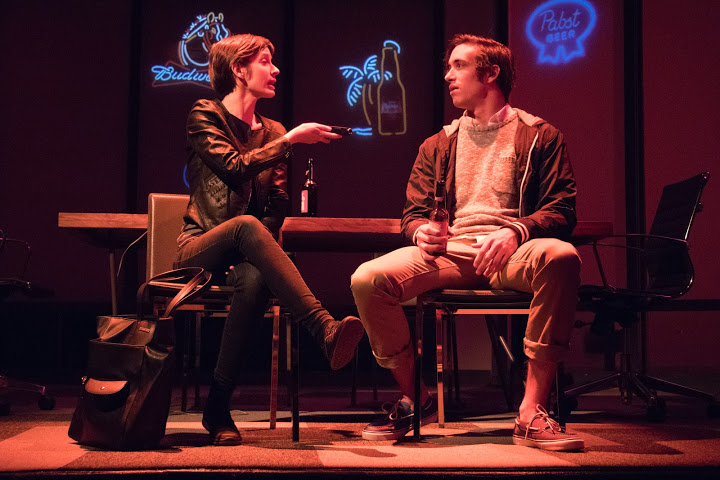By Beatrice Williams-Rude
Stet is a carefully crafted, beautifully executed play that deals with campus rape and its aftermath.
“Stet” is a copy editing/proofreader’s term meaning that the original material is correct and should stand. The cover of the program reads “Based on a true story.” which had been marked for deletion but overridden by “Stet.” Yes, it’s based on a true story.
“A Rape on Campus,” was a Rolling Stone article written by Sabrina Erdely. Stet was developed by playwright Kim Davies and further developed with Tony Speciale, who also is the splendid director, and Jocelyn Kuritsky, who does a fine job playing Erika, the journalist.
A reporter is attempting to write a story on campus rape and finding roadblocks from both the victims and perpetrators as well as institutional stonewalling. Ashley, exquisitely portrayed by Lexi Lapp, recounts a ghastly story. Gang raped in the dark in a frat house, she can’t really identify those who violated her. All she heard was one young man, not wanting to partake, being pressured by the others to be one of the “brothers.” Afterward, bloodied and shoeless, she walks through the house where the party is still in progress and nobody pays any attention to her.
Fear leads to her not making an official complaint. This is to be a leit motif, the victims being unwilling to take action, or even to speak about it, Of what are they afraid? The perpetrators, the college, and their largely unsympathetic peers, who cannot grasp the continuing pain.
Missing from Stet is mention of false rape claims—the Duke U. case and Tawana Brawley come to mind. Such cases almost certainly make it more difficult for genuine victims to step forward.
Among the reasons cited for victims’ reluctance to press charges: They’re afraid of being defined by the rape for the rest of their lives. “People are interested in my story, but not in me.” Feelings of having been sullied and of being worthless are also cited.
Bruce Mackenzie is nigh on perfect as Phil, the editor, bringing just the right balance of hard-nosed newsman, understanding employer, and sensitive father-figure. He brings a rare verisimilitude to the stage. A most telling sequence occurs when Erika confides that she’d been raped—not as horrific an incident as Ashley’s, more a consequence of “risky behavior,” but rape nonetheless.
Phil, sympathetic and supportive, thanks Erika for confiding in him. Erika then says it didn’t happen, that she was just testing to find out how he, Phil, would react if it happened to someone he knew. But it did, in fact, occur and it would seem Phil senses that.
Representing the college is Christina, ably portrayed by Déa Julien, who, it seems, was also a rape victim.
Jack Fellows brings explosive energy to the role of Connor, spokesman for the fraternity—but only for the local unit, not for the national organization, which he uses as part of his stonewalling. Whether he was also one of the perpetrators hangs heavily over the proceedings.
The spare production is most effective. The single set, by Jo Winiarski, is a newsroom. The excellent projection design, by Katherine Freer, shows us the principals being interviewed on MSNBC. Deidre Goodwin’s voice is that of the unseen interviewer..
Lighting is by Daisy Long, sound by Christian Frederickson.
The less-than satisfying ending is just what it should be, proving the validity of the victims’ fears.
Stet, presented by the Abingdon Theatre Company in association with the Muse Project, in previews since June 11, officially opens June 23 for a run lasting through July 10.
June Havoc Theatre, 312 West 36th Street, between Eighth and Ninth Aves.
Photos: Ben Strothman























